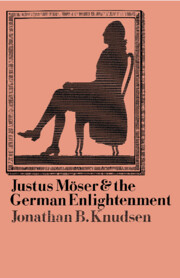Book contents
- Frontmatter
- Contents
- Preface
- Acknowledgments
- Abbreviations
- 1 Justus Möser in the German Enlightenment
- 2 Möser's social universe: urban notability and Enlightenment intelligentsia
- 3 Möser's political universe: secular politics in a confessional state
- 4 Moser's historical universe: regional history and cosmopolitan history
- 5 The party of incremental movement: social and economic reform in Möser's Osnabrück
- 6 Möser's social theory: local patriotism and the defense of the estates
- 7 The dialectic of Enlightenment: the debate over theory and practice
- Bibliography
- Index
3 - Möser's political universe: secular politics in a confessional state
Published online by Cambridge University Press: 17 September 2009
- Frontmatter
- Contents
- Preface
- Acknowledgments
- Abbreviations
- 1 Justus Möser in the German Enlightenment
- 2 Möser's social universe: urban notability and Enlightenment intelligentsia
- 3 Möser's political universe: secular politics in a confessional state
- 4 Moser's historical universe: regional history and cosmopolitan history
- 5 The party of incremental movement: social and economic reform in Möser's Osnabrück
- 6 Möser's social theory: local patriotism and the defense of the estates
- 7 The dialectic of Enlightenment: the debate over theory and practice
- Bibliography
- Index
Summary
In Chapter 2 I presented the social assumptions, commitments, and obligations that shaped Möser's mind and career. The extant material is simply too skimpy for a more careful chronological reconstruction. Above all we lack details concerning his twenties and thirties, the typical decades of revolt and reconciliation. What survives does not hint at any private search or crisis; like most of the biographical evidence, it stays at the surface of everyday life, revealing in this instance only the settled habits of a young and preferred advocate among the local notability. The brief glimpse of a fourteen-year-old running away from home is not repeated. Family and work, friendships, personal cultivation, and scholarship seem to extend themselves uneventfully. Möser's life, then, as far as we can reconstruct it, was not shaped by internal turmoil, rebellion of another kind, or religious conversion. The formative moments came from events in the life of the bishopric: the lengthy crisis of the Seven Years War, the change in political allegiance to Protestant Hanover in the midst of the war, and his expanded responsibilities in the episcopal administration. These substantially altered his intellectual character.
In this chapter, I describe the ways in which the confessional struggle and ecclesiastical institutions affected Justus Möser. Accordingly, the chapter enters the political world of the small states in far greater detail. It shows from the perspective of Osnabrück why the small states were the carriers of German “liberties,” why at the same time the institutional stalemate at the imperial level promoted the image of constitutional ineffectuality that has survived, and why, as a result, certain enlightened critics thought the future of Germany lay with the large states absorbing the smaller ones.
- Type
- Chapter
- Information
- Justus Möser and the German Enlightenment , pp. 65 - 93Publisher: Cambridge University PressPrint publication year: 1986

